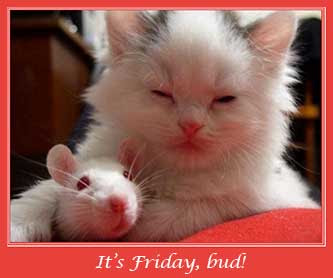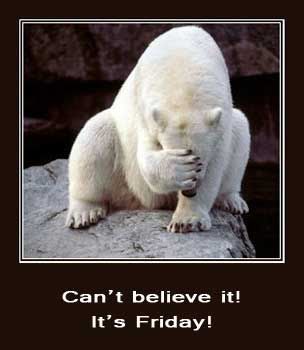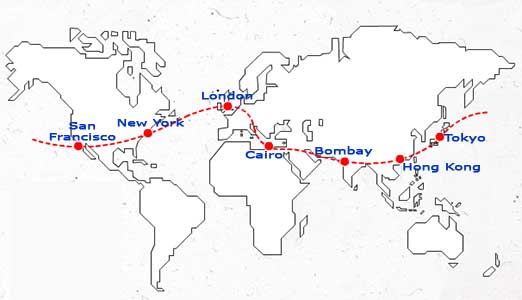
Cuando Palle Huld falleció el 26 de noviembre pasado, los periódicos –una semana después—titularon la noticia: "Muere Palle Huld, el reportero y actor que inspiró a Hergé para crear a Tintín" (El Mundo).
(When Palle Huld died on November 26, newspapers, a week after the news, titled "Danish Actor Said to Be Model for Tintin, Dies at 98" - The New York Times.)
Sin embargo, lo que me llamó la atención fue el que un chico de 15 años diera la vuelta al mundo solo.
(However, what struck me was the fact that a 15-year-old boy travelled around the world alone.)
La aventura de Huld empezó la mañana del 24 de febrero de 1928, cuando trabajaba en F.Bulow &Co, una empresa de automóviles en el centro de Copenhague, donde había entrado de aprendiz. Un compañero le enseñó entusiasmado un ejemplar del periódico "Politiken" que buscaba a chicos de 15 años para viajar alrededor del mundo siguiendo los pasos de Phileas Fogg, en conmemoración del centenario del nacimiento de Julio Verne.
(Huld's adventure began on the morning of February 24, 1928, while he was working at F. Bulow & Co, an automobile firm in the centre of Copenhagen, where he entered as an apprentice. A colleague showed him enthusiastically a copy of Politiken newspaper which advertised for 15-year-old boys to travel around the world in Phileas Fogg's footsteps in commemoration of the 100-year anniversary of Jules Verne's birth.)
El concurso era sólo para adolescentes y el ganador debería dar la vuelta al mundo solo y tenía que hacerlo en 46 días, utilizando cualquier medio de transporte excepto el avión.
(The contest was open only to teenage boys; the winner would circle the globe unaccompanied; and he had to complete the trip within 46 days, using any conveyance but the airplane.)
Según su autobiografía, sentía que "Algo en mí tenía que intentarlo". Corrió a casa a por el permiso de sus padres que le requerían. Pero cuando entró en el edificio del "Politiken" se sorprendió al ver los otros 350 aspirantes que llenaban la escalera a la espera de la entrevista.
(According to Huld's autobiography, "Something in me had to try it." He rushed home for the required parental permission slip. But when he entered the Politiken building, he was shocked by the 350 other hopefuls who filled the staircase waiting to be seen.)
Entrevistaban a los chicos individualmente preguntándoles qué harían en situaciones difíciles. Cuando le preguntaron que como reaccionaría si se encontrara en China habiendo perdido todas sus pertenencias, un chico contestó que "Intentaría encontrar a un danés que me ayudara."
(The boys were interviewed individually about what they would do in difficult situations. When asked how he would react if he found himself in China having lost his entire belongings, one boy answered that he would ‘try to find a Dane somewhere to help me'.)

Huld volvió a casa con sus incordiantes hermanas que aseguraban que Palle, "el niño de mamá", nunca sería elegido. Seguramente otros aspirantes – los estudiantes de secundaria de familias adineradas – fueran candidatos más adecuados que este aprendiz de pelo de zanahoria que no había completado su educación. Sin embargo, a su regreso a la oficina del "Politiken" más tarde ese día, Huld descubrió que era el elegido por el periódico.
(Huld returned home to his teasing sisters, who assured him that ‘mummy's boy Palle' would never be picked. Surely other contenders – high school students from wealthy backgrounds – were a more obvious candidate than this carrot-topped apprentice who had never completed his education? Yet on his return to the Politiken office later that day, Huld was the individual the newspaper chose.)
El tren de Palle salió de Copenhague el día 1 de marzo a las 8 de la mañana. A lo largo del camino al atravesar Dinamarca, multitud de gente enarbolaba banderitas y le ofrecían regalos para el viaje.
(Huld's train left Copenhagen at 8am on 1 March. All the way across Denmark crowds waved flags and offered small gifts for the voyage.)

Desde Copenhague, Huld tenía que cruzar Dinamarca hasta el puerto de Esbjerg, en la costa oeste de Jutlandia y luego viajar en barco a Inglaterra. Luego se dirigiría al norte de Escocia, para cruzar el Atlántico hasta Canadá, que cruzaría en tren antes de partir a Japón. La ruta le llevaría a través de Asia sudoriental, y a continuación, por el Ferrocarril Transiberiano por toda la Unión Soviética hasta Moscú, desde donde viajaría a través de Polonia a Alemania antes de regresar a Dinamarca.
(From Copenhagen, Huld was to cross Denmark to the port of Esbjerg on Jutland's west coast and then travel by boat to England. He would then head north to Scotland, crossing the Atlantic into Canada, which he would traverse by train before sailing to Japan. The route would then take him through south-east Asia, then by the Trans-Siberian Railway across the Soviet Union to Moscow, from where he would travel via Poland to Germany before returning home to Denmark.)

Lo que el "Politiken" no admitiría ante Huld ni ante sus lectores era su preocupación por la región de Manchuria devastada por la guerra, ahora convertida en una región de China. En 1928, Manchuria estaba en medio de una lucha entre las fuerzas soviéticas y los japoneses, que estaban tratando de poner un pie en China.
(What Politiken didn't admit to either Huld or their readers was their concern about the war-torn region of Manchuria, now a region in north-east China. In 1928, Manchuria was in the midst of a power struggle between Soviet forces and the Japanese, who were attempting to gain a foothold in China.)
El periódico pudo respirar tranquilo cuando Huld dejó Manchuria sano y salvo. Casi arruina todo el viaje en Canadá, sin embargo, cuando perdió el tren después de un viaje improvisado a San Juan para impresionar a una joven que había conocido en el barco. Sin embargo al final consiguió llegar a Montreal en un tren especial utilizado por los emigrantes.
(The paper could breathe a sigh of relief when Huld left Manchuria unscathed. He almost ruined the whole trip in Canada though, missing the cross country train after an impromptu tour of St. John to impress a young girl he had met on the boat. However he managed to reach Montreal on a special train used by emigrants.)

Cruzar el mundo en sólo 46 días sin utilizar el avión significaba que Huld no podía quedarse mucho tiempo en ningún país. Pero en sólo 48 horas, Japón logró dejarlo con una impresión duradera. El joven era una novedad en el Lejano Oriente, aunque esto tenía menos que ver con su viaje como con su pelo rojo.
(Crossing the world in just 46 days without the use of aircraft meant that Huld could not stop in any country for long. But in only 48 hours, Japan managed to leave him with a lasting impression. He was a novelty in the Far East, although this had less to do with his journey than with his red hair.)
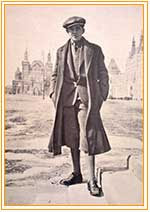
En Moscú fue dónde Huld se llevó el mayor susto del viaje. Llegó temprano y nadie salió a su encuentro por lo que decidió tratar de localizar el consulado danés por sí mismo. Después de una larga vuelta por la ciudad en carruaje de caballos, se había perdido irremediablemente. Al ver un Hotel Europa, le preguntó al personal de recepción que llamó por teléfono al consulado para enviar a alguien a su encuentro. Huld había tenido suerte. Los extranjeros en Moscú en ese momento podían ser fácilmente detenidos simplemente por dar un paseo sin escolta.
(Moscow gave Huld his biggest scare of the trip. He arrived early with no-one to meet him, and decided to try to locate the Danish consulate himself. After a lengthy tour of the city by horse-drawn cab, he was hopelessly lost. Noticing a Hotel Europa, he asked the reception staff who telephoned the consulate to send someone out to meet him. Huld had been lucky. Foreigners in Moscow at that time could easily be arrested simply for taking a walk without an escort.)
El viaje de Huld acabó bien, tras 44 días –dos menos de los previstos—para alivio de su madre a la que habían recetado pastillas para dormir. Con 20.000 personas esperando para darle la bienvenida, el viaje acabó con Huld a hombros de dos fornidos policías que se abrieron paso entre la multitud para llevarlo hacia donde lo esperaba su familia.
(Huld's trip ended safely after 44 days –two less than planned—much to the relief of his mother who had been prescribed sleeping tablets for the duration. With 20,000 people waiting to greet him on his return, Huld's journey ended on the shoulders of two burly policemen who pushed their way through the crowd to his waiting family.)
Para Huld, esta aventura sólo fue el comienzo de una vida dedicada al público. De 1933 al año 2000 disfrutó de una larga carrera de actor en Dinamarca, actuando sobre el escenario del Teatro Real Danés y protagonizando unas 40 películas.
(For Huld, this adventure was only the beginning of a life spent in the public eye. From 1933 to 2000 he enjoyed a lengthy acting career in Denmark, performing with the Royal Danish Theatre and appearing in 40 movies.)
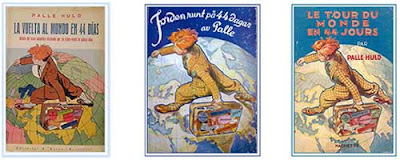
Huld describió su aventura en un libro titulado "La vuelta al mundo en 44 días" que apareció en 1930 en español y fue traducido a 11 idiomas.
(Huld wrote a book about his adventures which was published in 11 languages and appeared in English as "A Boy Scout Around the World" in 1929).
Que Hergé se inspirara en él para su personaje de Tintín es lo menos interesante de todo esto, a mi juicio. Ojalá pudiera encontrar el libro para leer este periplo.
(If Hergé was inspired by Huld to create his character Tintin is the least interesting thing of all, in my opinion. I wish I could find the book to read through this journey.)
Fuente: The Copenhagen Post
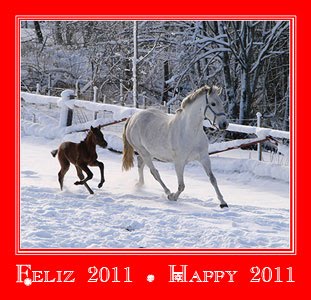
 Merchant of Venice, Act V. Scene I.
Merchant of Venice, Act V. Scene I. Hamlet, Act II. Scene II.
Hamlet, Act II. Scene II. Richard II, Act V, Scene v
Richard II, Act V, Scene v Julius Caesar, Act IV. Scene III.
Julius Caesar, Act IV. Scene III.









